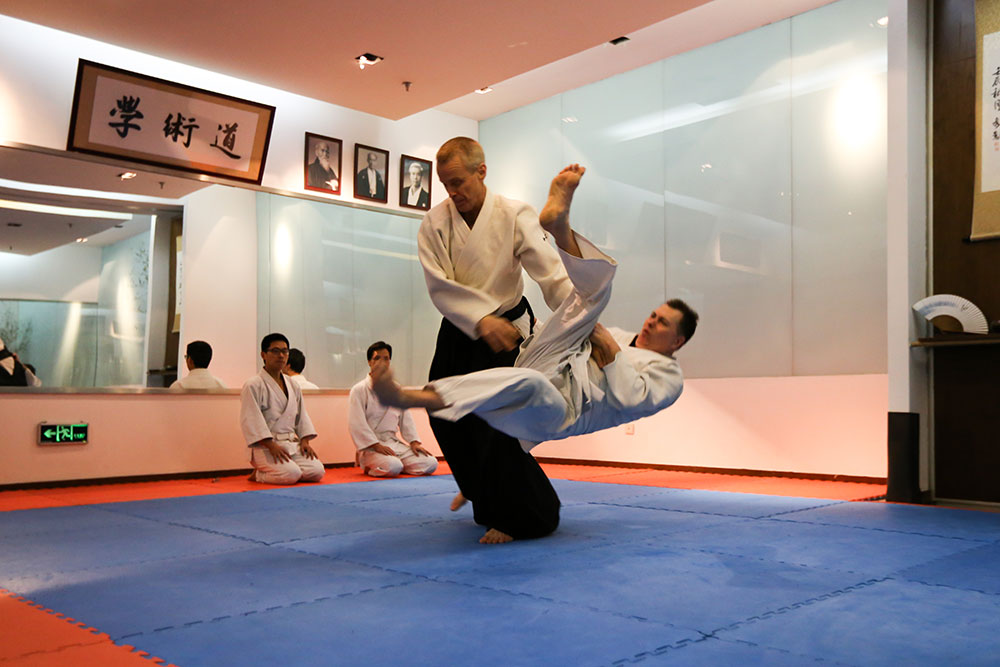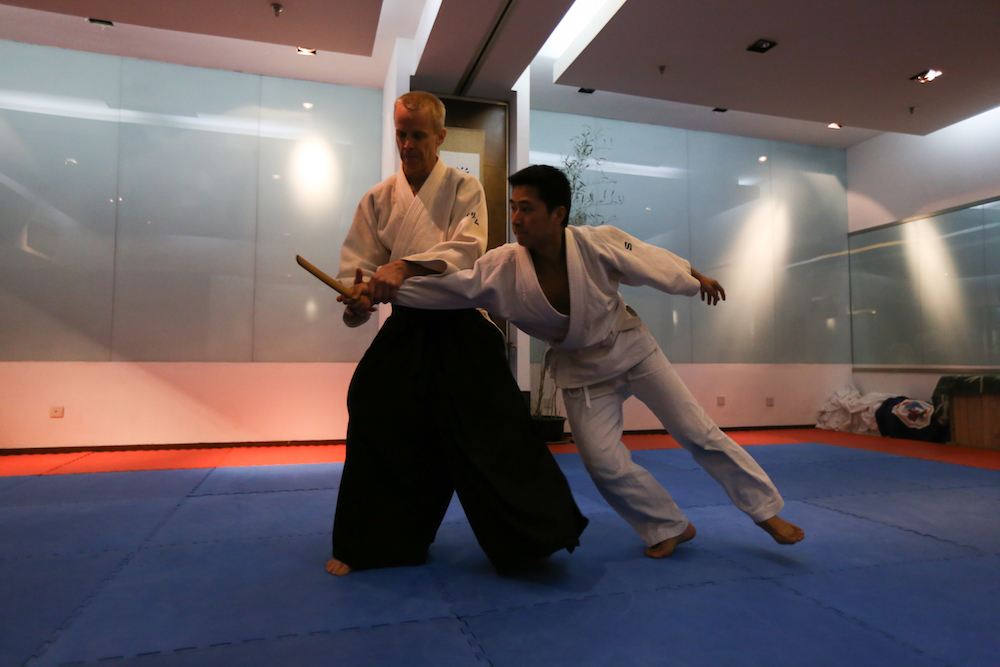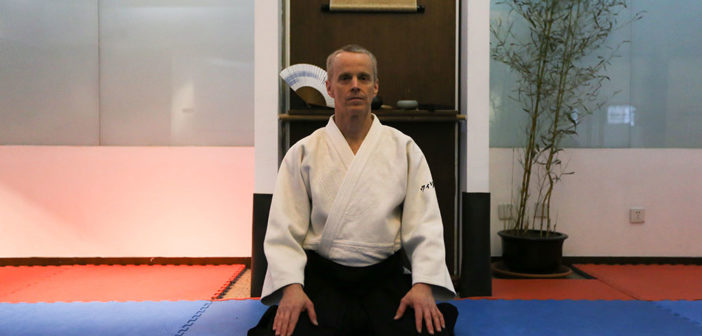When we arrived to check out this aikido class run by William Gillespie at Pulse Health Club at the Kempinski Hotel in Beijing, we weren’t sure what to expect. Our knowledge of aikido was fairly limited. Though we had visited other martial arts classes around the city before, there was something a little different about this one. There was no music playing as you might find in an MMA or Muay Thai gym, just serious concentration to the teacher’s instructions. As the practice moved on from breathing exercises, stretching, and other warm-up routines, the continuous drone of feet sliding and bodies landing on the mat began and would continue for the next hour and a half.

Sensei Gillespie would repeat numerous times throughout the class that aikido is experiential, not conceptual, drilling this into his students as he guided them through the repetitive movements of thowing and being thrown, which is a main component to this peaceful martial art.
The phrase “peaceful martial art” must sound like a contradiction to anyone who doesn’t know the history of this fighting style, founded only in the 1920s. In short, aikido was invented by Morihei Ueshiba as a means of defending oneself while also protecting your attacker from injury. In addition to being a form of self-defense, many of its practitioners also consider it the foundation of a philosophy that seeks to show compassion for those who wish to harm others. This is one of the major reasons why you won’t see much of it in the UFC arena.
Gillespie explains: “The emphasis of the practice is on human development, body, mind, and spirit. It’s not focused on winning or losing so much. It’s about using a technique and getting better and better at it. You also need to take care of your partner. You develop compassion, which from a Japanese martial arts perspective is essential to Bushido (the way of the warrior). The goal is to develop into a whole human being and reach your full human potential, and that requires hardship, sacrifice, and the giving up yourself to other people. You are using the process of practice to develop yourself.”
When discussing the encounters between teacher and student, he said, “I put pressure on my students on purpose, especially because we are not fighting. I can put verbal pressure on my students and sometimes my words can be a little bit harsh, but that’s because I’m trying to motivate the student so when they go to their job, suddenly their boss doesn’t scare them at all. This is how it was for me when I was a trial lawyer.”
William Gillespie has a finance company in London and also runs a law firm here in Beijing to help developing businesses, but he is beyond passionate regarding his involvement in the martial art of aikido. He made clear that he doesn’t teach aikido to make money, but to rather give something he loves to China.
In 1987 he began his aikido studies at a small dojo in the Little Tokyo neighborhood of Los Angeles. After ten years of constant practice he left his job as a trial lawyer and decided to do a full year of intensive training in Tokyo, Japan and remained there for the following eight years. This adventure of being totally immersed in the art and philosophies of aikido are documented in his book titled “Aikido in Japan and the Way Less Traveled.”
Initially, beijingkids wanted to talk with Gillespie about how dedicating your life to something like aikido can positively affect not only your physical health but also your mental health. Little did we know that the areas where this practice could benefit you are quite varied, and it’s just as beneficial to kids as it is for adults.
“The health benefits would be that the practice has an overall calming effect on your body. I think you learn to breathe better. You learn better posture, which then affects your spine, you’re more aware, you won’t get hit by a sanlunche as easily (he laughed). There’s a lot of advantages. All of the falling down is also very good for you. Your body gets used to that shock. When you get thrown down, it doesn’t hurt so much.
“For children this is fantastic. Your child learns confidence but most importantly learns to fall down and stand up. If they are knocked down, there is less chance of getting hurt. The Japanese say if you fall down nine times, you stand up ten times and if you learn that in life, you’ll go a long way. With children, I don’t teach as much joint manipulation because they’re young and their joints aren’t fully formed.” He says, “Usually a class for children whisks from thing to thing to keep them moving, but there’s enough in there to get them to pay more attention and then add a little bit of fun because the play is important.”
At this point, the conversation shifted from the physical benefits of aikido to more of the mental benefits gained from consistent practice. He said, “From the perspective of being healthy in Beijing, aikido practice is an hour where you can just cut your head off and train. You can literally lose yourself in it. It doesn’t require the distraction of music or being entertained. You are being taught, and there’s a big difference between the two.”
Gillespie began talking about how if you make life challenging in the training environment, that everything else outside of the dojo, gym, or elsewhere doesn’t seem so difficult.
He elaborates: “This kind of idea comes from Buddhism, but I would say that there are links to western thought here as well, like the perfection of your spirit. I read an article one time where I heard that people don’t change much after 30. That seemed so depressing to me. So I thought, why not find something that you could do constantly and use it to be bettering yourself in small ways?
“I think that the dojo is a place of forging, like a sword. How do you make a sword? You heat it up, you pound the hell out of it, and you plunge it into cold water. Then you take it out, heat it up, and do it again. I think if you can use the dojo in this fashion, you can overcome many things in your life, and it’s not just strength, it’s also becoming more compassionate and more aware.”
He says that there are six objectives in every class that relate to development. There’s your body development, intellect, energy, ethics, common sense, and intuition. Gillespie says, “In class, you begin to intuit really well because you’re grabbing people, so you have all of this body language you need to understand. Your level of intuition around body language and feeling is increased. You saw me doing the breathing exercises at the beginning. Why do that? Most people breath too high, especially as they feel pressure or more stress, breathing in your chest. That puts strain on your organs. If you learn to breathe diaphragmatically, like in yoga, you can service your body better, calm yourself down. That’s why I often say control your exhale. When you control your exhale, this controls the amount of carbon dioxide in your bloodstream and has a calming effect on the nervous system. These small things begin to make a difference if you are talking about a confrontation so that you can keep your mind calm.

“You really see people’s personalities when they get on the mat. You can’t hide it. I think it’s important towards developing self-awareness; to be very aware of yourself and to still be OK. I think martial arts practice is interested in helping you achieve your full best self and also it’s helping you look at yourself in reality and be OK with it, and from there know that you can achieve more with what you’ve been given. You can’t compare yourself to other people.
“To quote John Wooden (UCLA Basketball coach 1948-75), he says ‘Success is peace of mind and knowing that you’ve done the best you could do under whatever circumstances you were given.’ I think that aikido training, if you keep within its cultural context of teaching, can have this effect on you. You can learn how to demand more of yourself but still be content with yourself at the same time, and I think that’s a hard thing for a lot of people. Either they are punishing themselves too much, or they are too content.”
He ended our little talk by saying; “The whole world is your dojo. You can turn everything you’re doing into a kind of a game or a kind of way of training yourself, or a different experience in your life. Ultimately it should try and help you experience life on a deeper level than you were maybe aware of before. The study of martial arts is really the study of life and death, as that is what they were used for in the past. It helps you to realize how precious life is, and how precious your own life is. Don’t waste a minute of your own life, not even a million dollars can buy it back.”
Find out more about aikido in Beijing from Gillespie’s website: www.beijingaikikai.com
Photos: Courtesy of Willam Gillespie


1 Comment
Wonderful teacher!